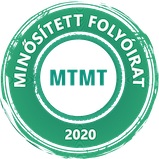A történeti személynévföldrajz mint a nyelvföldrajz egyik kutatási területe I.
A nyelvföldrajzi módszer a névtani kutatásokban
Absztrakt
The geography of historical personal names as a research area of Geolinguistics I. Name geographic methods in name studies
Spatial distribution of proper names – similarly to that of common nouns – is a natural consequence of language change; as a result, the geography of personal (especially family) names has recently become an important field of study in international and Hungarian Onomastics. The paper first outlines the history of previous Hungarian name geographical research, focusing on terminological questions. The author then discusses the relationship between Geolinguistics and name geographical research, using examples from ‘Történeti magyar családnévatlasz’ (Atlas of Hungarian Historical Family Names). Relations between the frequency of Christian names and that of family names are illustrated in the paper by the 15th–18th-century geography of the family name Benkő: the outstanding historical or contemporary frequency of family names derived from the same Christian name in an area is determined by the previous frequency of the base Christian name in the territory. Christian names can also be used to demonstrate the ethnic composition of the Carpathian Basin: the 18th century expansion of the southern Slavic and German ethnic groups is illustrated by the appearance of the names Jován and Fridericus (and their variants), respectively.




